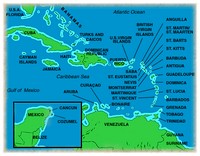Tourism & Tourists: The Greatest Power Against the Caribbean … $$$’s
Posted in: Aruba,boycott,Crime,Economy,Natalee Holloway,Travel
For those Caribbean countries that are so dependent upon the three S’s: “sun, sand and sea”  … tourism and tourists have more power than they have ever believed. According to the WTO the Caribbean is the most dependent upon tourism which makes the short sighted and myopic views of Aruba most puzzling. Risking all in an effort to cover up a crime and not want to do all they could in the initial stages to put the disappearance of Natalee Holloway to bed so their tourism would not be affected. Instead, they foolishly thought the matter would just go away. What do they think now?
… tourism and tourists have more power than they have ever believed. According to the WTO the Caribbean is the most dependent upon tourism which makes the short sighted and myopic views of Aruba most puzzling. Risking all in an effort to cover up a crime and not want to do all they could in the initial stages to put the disappearance of Natalee Holloway to bed so their tourism would not be affected. Instead, they foolishly thought the matter would just go away. What do they think now?
There are other Caribbean islands with much greater crime rates than Aruba that are prospering. The Caribbean is actually experiencing tourism growth. The people have a powerful way of voicing their opinions and dissatisfaction. Tourists voice it with their wallets and pocketbooks. Individual choice to right a wrong. There is no marketing campaign that can combat people’s opinions.
When will Aruba understand that perception is everything and it is not so much the crime that was committed against Natalee Holloway that they are being punished. It is the overt and conscious cover up to protect those with friends in high places. In this case, it was not the crime that destroyed Aruba’s tourism, but the cover up.
Fifteen million of those travelers, mainly from North America, head for the Caribbean, which is by far the most tourist-dependent region of the world. On smaller islands like St. Lucia, tourism’s contribution to the economy exceeds 70 percent, and the annual number of visitors far exceeds the resident population: Antigua’s 64,000 residents put out the welcome mat for 231,000 visitors one recent year.
On Caribbean tourist islands there has always been a sharp distinction between tourism and how locals view tourists. None more evident as in Jamaica as pointed out by the International Herald Tribune.
Nonetheless, the literature on Caribbean tourism is surprisingly critical. Foreign anthropologists complain about the “tourist gaze” and the distortion of local cultures; local chauvinists declaim that “tourism is whorism.” These criticisms are largely puerile. In Jamaica, it’s the locals who do the gazing while the tourists are busy baking themselves behind the high walls of all-inclusive hotels. If anything, tourism enhances residents’ awareness of indigenous cultures, and it supports large numbers of entertainers. Reggae artists have no problem singing dated versions of Harry Belafonte’s “Day-oh! Day da light an’ me wan’ go ‘ome” if it allows them to get nasty and ragamuffin the next night in the thriving dance hall music culture.
The other fact is that Jamaica has a terrible crime rate, yet tourism is flourishing. Why? Because tourists are going to the all-inclusive, gated communities where they are provided the feeling of safety. If one looked at all-inclusives in a simple manner, they would say that they are bad for the local economy. However, that is not the case. All-inclusives are a part of the economies of Caribbean Islands.
Jamaica has terrible crime rates, but that has little effect on tourism because travelers know they are safe inside the all-inclusives. Furthermore, the all-inclusives draw substantially on local suppliers. Overall, Jamaica, with a high ratio of local ownership and management, has relatively lower leakage. All-inclusives are actually a nimble adaptation to a volatile social environment. Jamaica’s socioeconomic failures cannot be linked to tourism, without which it would be in even more dire straits.
Return to: Tourism & Tourists: The Greatest Power Against the Caribbean … $$$’s
Social Web